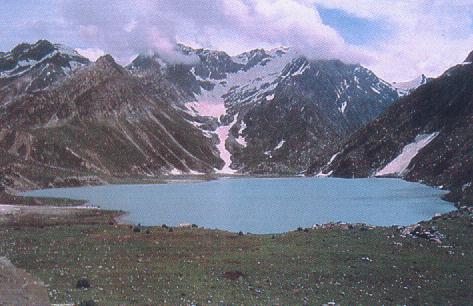Industries, Handicrafts, Export and
Import
Industrial
complexes have been established at Rangreth, Khunmoh and Doabagh in Kashmir
where the units for the manufacture of TV sets, radios, electronic clocks,
stablizers, tape recorders, jewels for watches, joinery articles, automobile
batteries, oxygen etc. have been set up.
Small Scale Industries
There has been a
remarkable increase in small-scale industrial units all over Jammu and Kashmir
in recent years. These units manufacture food products, beverages, machinery
parts, plastic goods, chemicals, drugs, paper products and automobile equipment.
Handicrafts In Kashmir, with its severe
winter when climate conditions are semi-arctic, craftsmen utilize their lesiure
as well as creative intelligence in creating artifacts of exquisite beauty.
Princely patronage encourged these handicrafts from early times till these
products, light in weight and rich in art, found a big market in India and
abroad. The State Government has set up many training centres for coaching young
boys and girls in traditional arts and crafts. As a result there has been a wide
dispersal of handicrafts throughout the State.
Kashmir is known for the
following handicrafts throughout the world:
1. The art of making carpets
is a gift of caravans coming into the valley from Central Asia. In the time of
Zain-ul-abdin Badshah, this art was greatly developed by imported skill and
royal patronage. The Europeans also took a keen interest in it. It resulted in
the establishment of more than 15 well known factories with about 350 looms
weaving carpets. Finest wool obtained from pashmina goats and marino sheep is
used in these factories. Cotton yarn is, however, imported from Amritsar.
2. Namdas are made
of wool of inferior quality and old woollen blankets are used for making gabbas.
The art of felting wool into namdas has come from Yarkand. Namdas and gabbas
are embroidered with thread, which gives colour, beauty and strength to them.
This cottage industry is concentrated in Anantnag, Rainawari and Baramula.
3. Lois (woollen
blankets) of Shopian and Bandipore are well known. Hand-woven blankets of
Rainawari are also durable and warm.Woollen pattus, tweeds, and worsted are
manufactured in many hand and power looms established in and around Srinagar.
4. The Kangri
making is a cottage industry concentrated in the areas on the banks of Wullar
lake near Watlab and at Tsrar and Botingo villages.
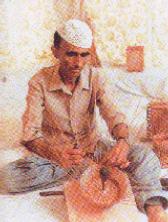
Wicker-work and basket
making are arts common to Kashmir and Jammu.
Kashmir is known for its wicker
willow. Wicker is used for making baskets, boxes, lamp-shades, curtain
rings, trays, chairs, tables, and cycle baskets etc. Srinagar, Harwan, Shalabug,
Hazartbal, and Sowra are the centres of its production. The cultivation of
wicker willow is the monopoly of the State .
5. Papier Mache is
a monoply of Kashmir. Pulp and paper are shaped into a variaty of decorative
articles and colorful designs are painted on them. The goods prepared are mostly
boxes, table lamps, toilet sets, jewellery boxes and other articles of
decoration. Srinagar, Rainawari and Anantnag are famous for this cottage
industry.
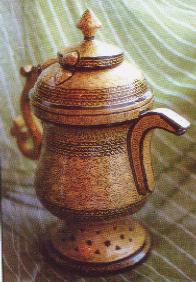
A papier mache replica of
a samovar.
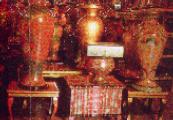
A rich display of papier
mache in a Srinagar shop.
6. Pashmina shawl
industry is an old industry of Kashmir. Pashmina wool used to come from Tibet
via Ladakh but since the invasion of China in 1962 and closing of the Leh
Yarkand route, Pashmina shawl and carpet industries have been affected greatly.
Now the raw material comes from Ladakh only. Moreover the water of river Jhelum
is most suitablefor washing pashmina wool. Best pashmina shawl is known as ring
shawl, a shawl that can pass through a wedding-ring.
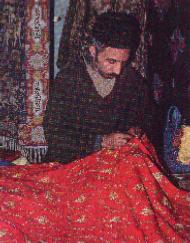
Embroidering a shawl with
Kashmiri motifs.
7. Silverware and
imitation jewellery. Silver-smiths, engravers and polishers work to make
beautiful silverware articles like teasets, tumblers, boxes, trays, soap cases,
toilet cases, and other articles of decoration. This work requires skill and
craft. Engraving is a speciality of the Kashmiri engravers. Kashmir purchases
about one lakh tolas of silver a year for this cottage industry. There are about
80 units of imitation jewellery at Srinagar. They prepare rings, cuff-links,
bangles, broaches, braclets, ear rings and tops etc.The raw material con- sists
of jade, cayz, pashm, tiger-gold, pheros, bakarmohar, cat's eyes and various
types of glass chatons and beads.
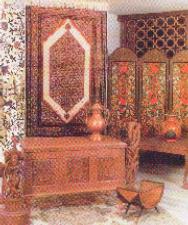
A range of carved
furniture and papier mache objects d'art.
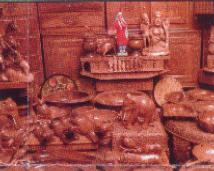
A display of souvenirs and
furniture made of walnut wood.
Large Industrial Units
1. Superior quality
woollen cloth, tweeds, blankets and suiting-cloth etc. are manufactured in a
factory run by the state Government. The factory was originally established by Sh.
A. K. Wattal. It has an annual turnover of goods worth rupees 60 lakhs. Besides,
there are many other private wollen Mills in Srinagar and Anantnag.
2. Raven Craft factory is
situated at a distance of about 6 Kms. from Srinagar which makes jams, juices,
squashes, sauces and pickles etc.
3. A brick and tile
factory is installed near Pompore and is a Government concern. It manufactures
about 15 thousand tiles and five thousand fire-proof bricks daily.
4. Government Cement
Factory is established at Wuyan (Srinagar). It produces about 60 tons of cement
daily.
5. Silk manufacture is the
oldest industry of the State which involves the production of raw silk and silk
fabrics. Silk worms are raised on mulberry
leaves as a cottage industry both in
Jammu and Kashmir provinces.
6. H.M.T. Comany has
recently started a very large watch factory at Zainakot (Sopore) in
collaboration with the State Government.
7. Government Spinning
Mills, Noshera (Srinagar) manufactures ruffel and knitting yarn to be used in the
other local factories for the manufacture of woollen cloth and knitwear.
|







